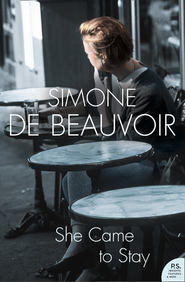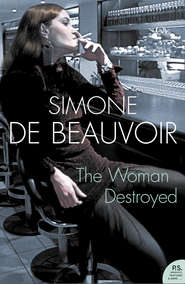По всем вопросам обращайтесь на: info@litportal.ru
(©) 2003-2024.
✖
The Mandarins
Автор
Год написания книги
2018
Настройки чтения
Размер шрифта
Высота строк
Поля
‘Don’t you think I dreamed of writing other kinds of books, too? But it was out of the question.’ He shrugged his shoulders. ‘To be able to continue taking an interest in things cultural in the face of Stalin and Hitler, you have to have one hell of a humanistic tradition behind you. But, of course,’ he went on, ‘in the country of Diderot, Victor Hugo, Jaurès, it’s easy to believe that culture and politics go hand in hand. Paris has thought of itself as Athens. But Athens no longer exists; it’s dead.’
‘As far as feeling the pressure of history is concerned,’ I said, ‘I think Robert could give you a few pointers.’
‘I’m not attacking your husband,’ Scriassine said, with a little smile that reduced my heated words to nothing more than an expression of conjugal loyalty. ‘As a matter of fact,’ he continued, ‘I consider Robert Dubreuilh and Thomas Mann to be the two greatest minds of this age. But that’s precisely it; if I predict that he’ll give up literature, it’s only because I have confidence in his lucidity.’
I shrugged my shoulders. If he was trying to soften me up, he was certainly going about it the wrong way. I detest Thomas Mann.
‘Robert will never give up writing,’ I said.
‘The remarkable thing in all of Dubreuilh’s works,’ said Scriassine, ‘is that he was able to reconcile high aesthetic standards with revolutionary inspiration. And in his own life, he attained an analogous equilibrium: he was organizing vigilance committees at the same time he was writing novels. But it’s precisely that beautiful equilibrium that’s now becoming impossible.’
‘You can count on Robert to devise some new kind of equilibrium,’ I said.
‘He’s bound to sacrifice his aesthetic standards,’ Scriassine said. Suddenly his face lit up and he asked in a triumphant voice, ‘Do you know anything about prehistoric times?’
‘Not much more than I do about chess.’
‘But perhaps you know this: that for a vast period of time the wall paintings and objects found in caves and excavations bear witness to a continuous artistic progress. Abruptly, both drawings and sculptures disappear; there’s an eclipse lasting several centuries which coincides with the development of new techniques. Well, just now we’re at the edge of a new era in which, for different reasons, humanity will have to grapple with all sorts of difficult problems, leaving us no time for the luxury of expressing ourselves artistically.’
‘Reasoning by analogy doesn’t prove very much,’ I said.
‘All right then, let’s forget that comparison,’ Scriassine said patiently. ‘You’ve probably been too close to this war we’ve gone through to properly understand it. Actually, it was something entirely different from a war – the liquidation of a society, and even of a world, or rather the beginning of their liquidation. The progress that science and engineering have made, the economic changes that have come about, will convulse the earth to such an extent that even our ways of thinking and feeling will be revolutionized. We’ll even have difficulty remembering just who and what we had once been. And among other things art and literature will become nothing more than peripheral divertissements.’
I shook my head and Scriassine resumed heatedly: ‘Don’t you see? What weight will the message of French writers have when the earth is ruled by either Russia or the United States? No one will understand them any more; very few will even speak their language.’
‘From the way you talk, it would seem you’re rather enjoying the prospect,’ I said.
He shrugged his shoulders. ‘Now isn’t it just like a woman to say a thing like that! They’re simply incapable of being objective.’
‘Well, let’s be objective then,’ I said. ‘Objectively, it’s never been proved that the world must become either American or Russian.’
‘In the long run, give or take a few years, it’s bound to happen.’ With a gesture of his hand, he stopped me from interrupting him and then gave me one of his charming Slavic smiles. ‘I think I understand you. The liberation is still fresh in your mind. All of you are wading shoulder deep in euphoria. For four years you suffered a great deal and now you think you’ve paid enough. Well, you never can pay enough,’ he said with a sudden harshness. He looked me squarely in the eyes. ‘Do you know there’s a very powerful faction in Washington that would like to see the German campaign continued right up to Moscow? And from their point of view they’re right. American imperialism, like Russian totalitarianism, requires unlimited expansion. In the end, one or the other has to win.’ A note of sadness entered his voice. ‘You think you’re celebrating the German defeat, but what you’re actually witnessing is the beginning of World War Three.’
‘Those are your prognostications,’ I said.
‘I know Dubreuilh believes in peace and in the possibility of maintaining a free and independent Europe,’ Scriassine said. ‘But even brilliant minds can sometimes be mistaken,’ he added with an indulgent smile. ‘We’ll be annexed by Russia or colonized by America, of that you can be sure.’
‘Well, if that’s the case, then there’s no impasse,’ I said gaily. ‘If it’s inevitable, what’s the sense of worrying about it? Those who enjoy writing will just go right on writing.’
‘What an idiotic game that would be! To write when there’s no one to read what you’ve written.’
‘When everything has gone to hell, there’s nothing to do but to play idiotic games.’
Scriassine remained silent for a moment and then a half-smile crossed his face. ‘Nevertheless, certain conditions would be less unfavourable than others,’ he said confidently. ‘If Russia wins, there’s no problem: it’s the end of civilization and the end of all of us. But if America should win, the disaster wouldn’t be quite so bad. If we were able to give her certain values while maintaining some of our own ideas, there’d be some hope that future generations would one day re-establish the ties with our own culture and traditions. But to succeed in that would require the total mobilization of all our potential.’
‘Don’t tell me that in case of a war you’d hope for an American victory!’ I said.
‘No matter what happens, history must inevitably lead to a classless society,’ Scriassine said in reply. ‘It’s a matter of two or three centuries. But for the happiness of those men who’ll be living during the interval, I ardently hope that the revolution takes place in a world dominated by America and not by Russia.’
‘In a world dominated by America,’ I said, ‘I have a sneaking suspicion that the revolution will cool its heels a good long time.’
‘And you think that it should be a Stalinist revolution? The idea of revolution had quite an appeal in France, around 1930. But let me tell you, in Russia it wasn’t quite so appealing.’ He shrugged his shoulders. ‘You’re preparing a big surprise for yourselves! The day the Russians occupy France you’ll begin to realize what I mean. Unfortunately, it’ll be too late then.’
‘You yourself don’t believe in a Russian occupation,’ I said.
Scriassine sighed. ‘So be it,’ he said. ‘Let’s be optimists. Let’s admit that Europe has a chance of remaining independent. But we can’t keep her that way except by waging a constant, interminable battle. Working for oneself will be entirely out of the question.’
I did not attempt to answer him. All that Scriassine wanted was to reduce French writers to silence, and I clearly understood why. There was nothing really convincing in his prophecies, and yet his tragic voice awakened an echo in me. ‘How shall we live?’ The question had been painfully pricking me all evening and for God knows how many days and weeks.
Scriassine looked at me intently. ‘One of two things can happen. If men like Dubreuilh and Perron look the situation square in the face, they’ll become involved in things that will demand all their time, all their energies. Or if they cheat and obstinately continue to write, their works will be cut off from reality, and deprived of any future; they’ll be like the words of blind people, as distressing as Alexandrine poetry.’
It’s difficult to engage in a discussion with someone who, while talking of the world and of others, talks constantly of himself. I was unable to speak my mind without hurting him. Nevertheless I said, ‘It’s useless trying to imprison people in dilemmas; life always causes them to break out.’
‘Not in this case. Alexandria or Sparta, there’s no other choice. It’s far better to admit a thing like that today than to put it off,’ he said rather gently. ‘Sacrifices are no longer painful when they’re behind you.’
‘I’m sure Robert won’t sacrifice anything.’
‘We’ll talk about it again a year from now,’ Scriassine said. ‘A year from now he’ll either have deserted politics or he’ll have stopped writing. I don’t think he’ll desert.’
‘And he won’t stop writing either.’
Scriassine’s face grew animated. ‘What would you like to bet? A bottle of champagne?’
‘I’m not betting anything at all.’
He smiled. ‘You’re the same as all women; you need fixed stars in the heavens and milestones on the highways.’
‘You know,’ I said, shrugging my shoulders, ‘those fixed stars did quite a lot of dancing around during the last four years.’
‘Yes, and nevertheless you’re still convinced that France will always be France, and Robert Dubreuilh, Robert Dubreuilh. If not, you’d be lost.’
‘Listen,’ I said cheerfully. ‘Your objectivity begins to seem rather doubtful.’
‘I’m forced to follow you on your grounds; you oppose me with nothing but subjective convictions,’ Scriassine said. A smile warmed his inquisitive eyes. ‘You take things very seriously, don’t you?’
‘That depends.’
‘I was warned about that,’ he said. ‘But I like serious women.’
‘Who warned you?’
With a vague gesture, he indicated every one and no one. ‘People.’
‘What did they tell you?’
‘That you were distant and austere. But I don’t really think so.’
I pressed my lips together, hoping it would prevent me from asking further questions. I’ve always been able to avoid being caught by the snare of mirrors. But the glances, the looks, the stares of other people, who can resist that dizzying pit? I dress in black, speak little, write not at all; together, all these things form a certain picture which others see. I’m no one. It’s easy of course to say ‘I am I.’ But who am I? Where find myself? I would have to be on the other side of every door, but when it’s I who knock the others grow silent. Suddenly I felt my face burning; I felt like ripping it off.







